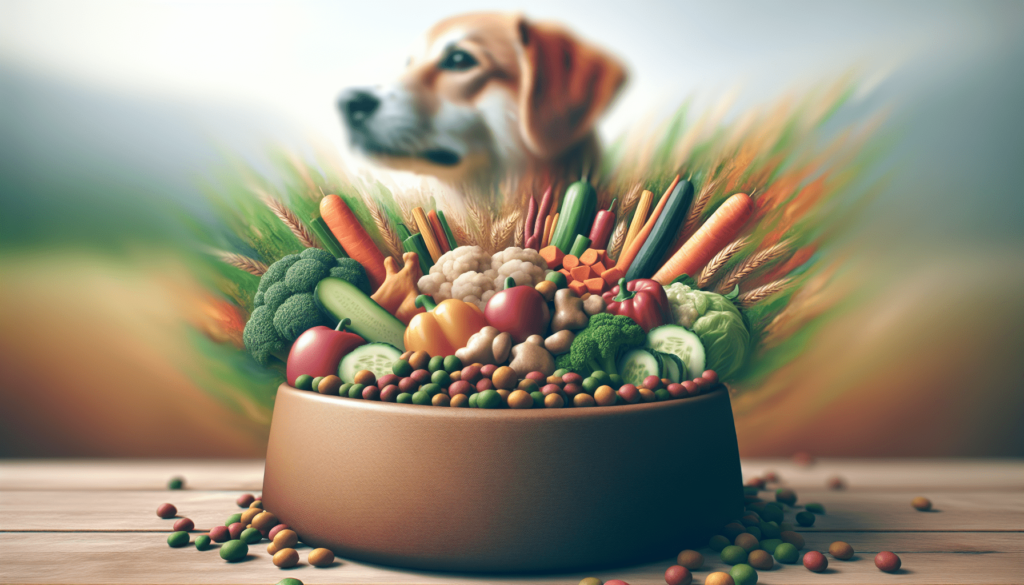How do I know if my dog is getting enough vitamins and minerals? As a pet owner, I’m sure you’ve often wondered if your furry friend is getting the necessary nutrients to lead a healthy and active life. Just like humans, dogs require a balanced diet rich in essential vitamins and minerals to maintain optimal health. But how can I ensure my dog is actually getting everything they need? In this article, I’m going to explore various aspects of a dog’s nutritional needs and offer guidance on making sure your beloved pet is well-nourished.

Understanding the Importance of Vitamins and Minerals for Dogs
Just like in humans, vitamins and minerals play a crucial role in a dog’s overall health. These nutrients are involved in virtually every body function, from maintaining a healthy immune system to supporting proper bone development. Without an adequate supply of vitamins and minerals, my dog could be at risk for a variety of health issues.
What Are Vitamins and Minerals?
Vitamins are organic compounds that dogs need in small quantities for normal metabolic functions. Minerals, on the other hand, are inorganic substances that must be obtained through diet. Both are vital and should be an integral part of my dog’s diet to ensure they remain healthy and energetic.
Why Are They Essential?
The essential vitamins and minerals are necessary for various bodily functions, such as wound healing, blood clotting, muscle function, and nerve transmission. They also help in disease prevention by boosting the immune system, and I must ensure my dog has an adequate supply to keep them healthy and happy.
Recognizing the Signs of Nutritional Deficiencies in Dogs
To determine if my dog is receiving enough vitamins and minerals, I should be aware of the signs indicating potential deficiencies. These symptoms can sometimes be subtle, but they are important indicators of my dog’s overall health.
Common Signs of Vitamin Deficiency
When my dog lacks essential vitamins, I might notice symptoms such as lethargy, poor coat quality, or changes in appetite. Other signs include:
- Weakness or lethargy
- Skin issues, such as dryness or irritation
- Poor growth in puppies
- Degenerative joint conditions
Common Signs of Mineral Deficiency
Mineral deficiencies can also cause significant health problems in dogs. Symptoms can include:
- Weak or brittle bones
- Muscle tremors or weakness
- Anemia and resultant pale gums
- Digestive issues, such as diarrhea or constipation

Ensuring a Balanced Diet for My Dog
To prevent nutritional deficiencies, it is important that my dog receives a balanced diet containing all the necessary vitamins and minerals. But what exactly should I be feeding them to achieve this?
Understanding Dog Food Labels
When choosing the right food for my dog, it is crucial to understand dog food labels. Commercial dog foods are usually formulated to meet the nutritional needs of my pet, but it’s necessary to read labels carefully to ensure it provides the correct balance of nutrients.
Types of Dog Food
Dog food comes in various forms: dry kibble, wet canned food, and raw food. Each type has its pros and cons, and my choice will depend on convenience, budget, and my dog’s specific needs:
- Dry Kibble: Often more affordable and has a longer shelf life, it is generally formulated to provide a balanced diet.
- Wet Canned Food: Can be more palatable for picky eaters, but it is typically more expensive and requires refrigeration after opening.
- Raw Diets: Some dog owners prefer a raw food diet, believing it’s more natural, but it requires careful preparation to be nutritionally complete.
Supplements: When and How to Use Them
Sometimes, providing a balanced diet alone is insufficient, especially for dogs with special needs or health conditions. In such cases, supplements can be an effective way to ensure my dog is receiving adequate nutrients.
When Do Supplements Help?
Supplements can be beneficial if my dog has specific deficiencies or increased nutritional demands due to age, activity level, or health issues. Before adding any supplement to my dog’s diet, consulting a veterinarian is essential to avoid over-supplementation.
Common Supplements for Dogs
There are various supplements available to help fulfill my dog’s nutritional needs:
- Multivitamins: Offer a range of vitamins to safeguard against deficiencies.
- Mineral Supplements: Such as calcium or phosphorous, to support bone health.
- Fatty Acids: Like Omega-3, to enhance coat quality and joint health.
Ordinary Foods That Are Rich in Vitamins and Minerals
Incorporating certain human foods into my dog’s diet can provide additional vitamins and minerals. However, it is crucial that I only offer these in moderation and as part of a balanced diet.
Fruits and Vegetables
Fruits and veggies can be excellent sources of vitamins and minerals for my dog:
- Carrots: Rich in beta-carotene, carrots offer benefits for skin and vision.
- Blueberries: High in antioxidants and Vitamin C, promoting a strong immune system.
- Spinach: Contains iron and calcium, beneficial for blood and bone health.
Proteins and Whole Grains
Some dogs may also benefit from modest amounts of certain proteins and whole grains:
- Chicken or Fish: Provides high-quality protein and essential amino acids.
- Brown Rice: Offers fiber and essential B vitamins for digestive health.
Testing for Nutritional Deficiencies
If I am concerned that my dog might not be getting enough nutrients, a vet visit and testing can provide definitive insight into their nutritional health.
Blood Tests and Other Diagnostics
Veterinarians can conduct blood tests to assess levels of certain vitamins and minerals, confirming or ruling out nutrient deficiencies. This can be crucial in formulating a nutritionally complete diet for my dog.
Regular Check-ups
Regular vet check-ups are essential to monitor my dog’s health, look for early signs of deficiencies, and adjust their diet or supplements as required.
Frequently Asked Questions
How do I know if my dog is getting enough vitamins and minerals?
By monitoring their health, looking for signs of deficiencies, maintaining a balanced diet, and having regular vet check-ups, I can ensure my dog is getting adequate vitamins and minerals.
Is it okay to give my dog human vitamins?
Generally, it’s not recommended to give human vitamins to dogs without consulting a vet, as their needs differ from ours, and certain vitamins can be harmful in large doses.
What foods are dangerous for dogs?
Some foods that are safe for humans can be toxic to dogs, including chocolate, grapes, onions, and garlic. Always ensure any new foods are safe before sharing them with my pet.
Can a dog have too many vitamins and minerals?
Yes, over-supplementing can lead to hypervitaminosis or mineral toxicity, which can be detrimental to a dog’s health. Always consult a vet before adding supplements to their diet.
How does age affect my dog’s nutritional needs?
As dogs age, their metabolism and nutritional requirements change. Older dogs may need food that is lower in calories but enriched with nutrients addressing specific health concerns like joint health.
Empowered with a deeper understanding of my dog’s nutritional needs, I can help ensure they maintain good health throughout their lives. It’s all about balance and awareness, so together, let’s make sure our furry companions get the best care possible.



